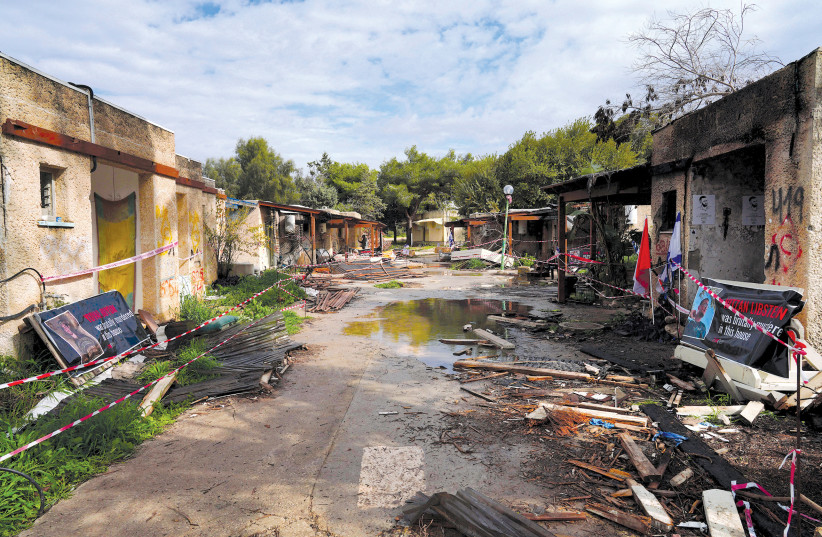All you have to do to set off a firestorm in Israel is say “Palestinian state.”
For more stories from The Media Line go to themedialine.org
Suddenly, it seems that nearly everyone is outraged, incensed, and otherwise triggered by the reference coming from the US, EU, and others about setting up a Palestinian state.
“It’s a prize for terrorism,” complain some. “It would put a Hamas state on Israel’s doorstep,” warn others. Or as Israeli Prime Minister Benjamin Netanyahu put it with characteristic understatement and sensitivity, “It would bring Oct. 7 to Kfar Saba.” Kfar Saba is a suburban town northeast of Tel Aviv.
For those of you who have been living in Antarctica for the past five months, Oct. 7 is the date on which Hamas sent thousands of terrorists across Israel’s border with Gaza to massacre, rape, and burn 1,200 Israelis and kidnap over 200 others.

Objective reasoning
Let’s take a breath here. There are objective reasons why Israel should not be reacting so negatively to its allies floating the idea of a Palestinian state. Here are a few:
- It’s not going to happen.
- Israel would do itself a favor by taking part in the process of negotiating toward a Palestinian state, because
- It’s not going to happen.
- Creation or even declaration of a Palestinian state would relieve Israel of several burdensome chores, but (did we mention already?)
- It’s not going to happen.
Let’s start with points 1, 3, and 5. It’s not going to happen because the Palestinians will never accept a state within reasonable parameters. They have painted themselves into a corner with their outlandish, non-negotiable “right of return” claim, as if 5.9 million “refugees” have the God-given right to “return” to the villages in Israel that their grandparents left 75 years ago.
Many of the villages don’t exist anymore, and anyway, that demand would mean that while the Palestinians would have their own state, they would insist that the majority of their people must go and live in someone else’s state, namely Israel.
Not only that, but in turning down Israel’s offer of a state in the equivalent of all of the West Bank and Gaza, a link between the two through Israel, and parts of Jerusalem to boot, the chief Palestinian negotiator, quoting his president, declared that the Palestinians would not compromise over “a single inch … a single stone” of East Jerusalem. That would mean erasing the history and development of the past five-plus decades.
It’s part of a pattern. The Palestinians are always demanding to go back to the borders and situations they rejected last time around. They rejected the 1947 UN partition, starting a war that ended up with cease-fire lines. Now those lines have been enshrined as the holy “1967 borders,” because Israel crossed the lines and captured the West Bank, Gaza, Golan Heights and Sinai in a war the Arabs provoked in 1967. Israel’s offers in 2000 and 2008 to trade territory on either side of the cease-fire lines were rejected.
So really, it’s not going to happen. Therefore, Israel has nothing to lose by saying, “OK, we’re in, let’s see where this leads, no guarantees.”
Point 2, taking part in the process, means that if in the end, a coalition of moderate Arab states and Western powers does come up with an interim stage that includes taking over rule of the West Bank and Gaza, drawing a border, and guaranteeing peace and quiet with permission for Israel to act it its own defense, it’s hard to figure how that would be harmful to Israel.
Oh, of course, Israel has been saying for decades that it can’t trust anyone else with its security. But Israel just bungled its way into a situation where it can’t go it alone anymore. That is the “price” that Israel must pay for its own negligence on Oct. 7.
Hamas is to blame for its atrocities, but Israel let it happen. As a result, Israel was forced to bring in outside parties to help it fight Hamas, and that’s never for free. It would be better to accept the price and work with the coalition, instead of opposing it and being lumped together with the consistently rejectionist Palestinians.
Point 4 is something to think about, for the Palestinians, too.
Under the Oslo process, the partial peace accords Israel signed with the Palestinians between 1993 and 1995, Israel undertook a number of obligations. If a Palestinian state were created, or even if the Palestinians declared that they have a state, the painfully detailed and explicit Oslo Accords would be automatically canceled.
Trashing them would mean, for starters, no more Palestinian use of Israeli seaports. Israel would no longer collect taxes for the Palestinians. Coordination of customs duties would end. So would security cooperation; that would revert to the Arab-international sponsors.
Not only that, but recognized borders would mean the end of the “occupation.” Israel could close its borders completely if it so decided. Every nation has the right to seal its borders. Just as Israel’s borders with Syria and Lebanon are closed, so too could the border between Israel and a Palestinian state be closed. Tens of thousands of Palestinian workers in Israel? Treatment of Palestinian patients in Israeli hospitals? Commerce? Not unless Israel agrees.
Point 4 is the main reason why legendary Palestinian leader Yasser Arafat never implemented the clauses in the Oslo Accords that authorized him to declare a Palestinian state as early as 1997.
None of the above conditions has changed. That’s why when it comes to a Palestinian state, Israel need not fear. It’s not going to happen.
Mark Lavie has been covering Israel and the Middle East since 1972. His second book, “Why Are We Still Afraid?” recaps his career and comes to a surprising conclusion.
